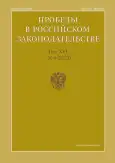Typical Investigative Situations and Versions of the Initial Stage of the Investigation of Fraud in the Field of Lending
- Authors: Dzyuba A.O.1,2, Mahtaev M.S.1
-
Affiliations:
- Lomonosov Moscow State University
- Judicial Department at the Supreme Court of the Russian Federation
- Issue: Vol 16, No 6 (2023)
- Pages: 178-184
- Section: Criminal Law Sciences
- URL: https://bakhtiniada.ru/2072-3164/article/view/232152
- ID: 232152
Cite item
Abstract
The article is devoted to practically significant and fundamental aspects in the investigation of fraud in the field of lending – the analysis of investigative versions and investigative situations. These two components set the direction of the investigation and affect its dynamism. In situations of investigation of credit fraud, the above is of particular importance, since credit fraudsters quickly eliminate traces of the crime and promptly realize the stolen property. Moreover, the growth of crimes in the field of lending is growing rapidly, credit fraudsters are adapting to modern realities, inventing and improving ways of stealing credit funds, which poses a threat to both the economic security of the country and the development of trade. A correct understanding of typical investigative situations, a logically competent construction of investigative versions will allow you to quickly begin the process of investigating credit fraud, to approach the production of investigative actions in a structured manner. Thanks to the generalization and systematization of the rich experience of forensic scientists on the issue of putting forward investigative versions and assessing investigative situations that develop at the initial stage of the investigation of crimes, the authors of this article were able to offer an up-to-date typification of investigative situations that takes into account the realities of the lending sector and the ability of investigative authorities to investigate credit fraud.
The purpose of the research is: the study of problems related to the investigation of fraud in the field of lending, the study of the most likely investigative situations that arise during the investigation of this crime; typification of investigative situations that develop at the initial stage of the investigation of credit fraud.
The results of the research made it possible to identify problematic aspects in the investigation of credit fraud and develop their own criteria for the typification of investigative situations that develop at the initial stage of the investigation of fraud in the field of lending. In particular, the classification of investigative situations is based on: the availability of information about the subject of criminal encroachment; the totality of information available to the investigator about the nature and volume of unreliable data provided from the attacker to the lender to obtain loan funds. By analyzing typical investigative situations of the initial stage of the investigation of credit fraud, it was possible to determine both the patterns of criminal activity and the algorithm of the investigator's actions to organize the investigation of the crime.
Full Text
##article.viewOnOriginalSite##About the authors
Aleksandr O. Dzyuba
Lomonosov Moscow State University; Judicial Department at the Supreme Court of the Russian Federation
Email: lyuba.muerte@yandex.ru
SPIN-code: 8705-8172
Scopus Author ID: 1208836
Postgraduate Student; Faculty of Law, Lomonosov Moscow State University
Russian Federation, Moscow; MoscowMakhtai S. Mahtaev
Lomonosov Moscow State University
Author for correspondence.
Email: mahtaev@mail.ru
Dr.Sci.(Law), Professor, Professor of the Department of Criminalistics, Faculty of Law
Russian Federation, MoscowReferences
- Gavlo V. K. Problems of theory and practice of investigation of embezzlement of funds in the field of bank lending: monograph / V. K. Gavlo, M.A. Neymark; Federal Agency for Education of Russia, Altai State University. – Barnaul: Publishing House of the Altai State University, 2009. – pp. 110-115.
- Danilova N. A. Methods of investigation of crimes in the sphere of banking activity: questions of theory and practice : dis. ...Dr. yurid. sciences'. – St. Petersburg, 2006. – p. 212.
- Erakhtina E. A. The main stages of the methodology of fraud investigation in the field of lending //Socio-economic and Humanitarian Journal of the Krasnoyarsk State University. 2015. No. 2. – pp. 88-101.
- Korepanov G. N. Typical traces of fraud in the field of lending // Business in law. – 2014. - No. 5. – pp. 160–163.
- Kuzmenko E. S. Investigation of fraud in the sphere of crediting – nuances of proof and some investigative situations // Bulletin of the Nizhny Novgorod Academy of the Ministry of Internal Affairs of Russia. – 2016. – No. 34. – pp. 387-389.
- Martynov A. N. Preliminary verification of reports of fraud in the field of lending: issues of forensic support // Society and power. – 2015. – No. 51. – pp. 87-89.
- Tagirov R. A. Investigative versions on cases of fraud investigation in the sphere of crediting of legal entities and individual entrepreneurs // A Russian investigator. – 2021. – No. 9. – p. 27.
- Filippov, A.G. Criminalistics: textbook / under the general editorship of A.G. Filippov. – 4th ed., reprint. and additional-M.: Higher education, 2011. - 690 p.
- Shcherbachenko A. K. Typical versions of fraud committed by a group of persons and their place in the system of basic methods of their disclosure and investigation // Philosophy of Law. – 2020. – № 1 (92). – P. 167.
Supplementary files








